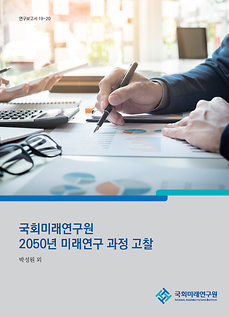
This study examines the process of research on the future in 2050 conducted by the National Assembly Futures Institute from 2018 to 2019 and discusses its achievements and limitations. The world's major future research institutes have established their own future research theories and methodologies. These research institutes have been developed and have enhanced their future research capabilities through numerous trials and errors over a long period of time. It is essential for the National Assembly Futures Institute, Korea's first institute established in the National Assembly to predict the mid- to long-term future of the country and prepare alternative options and possibilities, to critically analyze the past research process and present alternatives in order to grow into a world-class future research institute.
The researchers assumed a cyclical model consisting of 1) predicting the future in 2050, 2) choosing the people's preferred future based on the predictions, 3) suggesting policies for realizing the preferred future, and 4) performing continuous evaluation of future research, and looked back on the process and experience at each stage of the research.
This research report includes forecasts for 2050 in 13 fields that were arrived at after intensive efforts in 2018, a comprehensive scenario that integrated these predictions, the results of a public opinion survey conducted in 2019 to find out the people's preferred future, the results of a preferred future survey for experts, policy priorities for realizing the preferred future and policy proposals, and the evaluation of the future research process by internal researchers.
The evaluation of the future research conducted over the past two years found that there is a need for the enhancement of researchers' ability to converge and integrate issues in each field, a need for greater efforts to elaborate the derivation of variables for future predictions, a need for better development of methodologies for mid- to long-term future predictions, and greater reinforcement of the linkage between predictions and policies. In addition, follow-up tasks suggested in this research include the adjustment of the methodologies for future forecasting that vary in each field, securing of evidence and data supporting long-term future forecasts, and presentation of future research results that do not undermine political neutrality.
Looking back on the process of the previous research, the researchers found some important principles that they need to maintain and uphold in their future research efforts, including continuously carrying out future research regardless of the vicissitudes of the government, expanding opportunities for citizens to participate in future research, making efforts to test durability of future policies when presenting policies based on future research, and constantly performing critical evaluation of the researcher. Particularly, the researchers emphasize that the institute should strive to enhance civil society's recognition of the necessity of national-level future research and their belief that their participation can contribute to designing a better future.